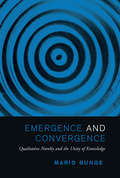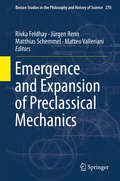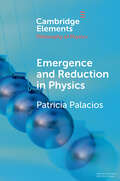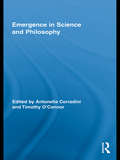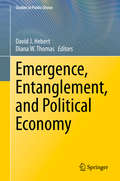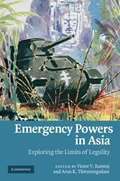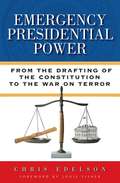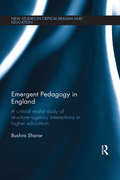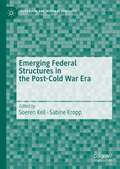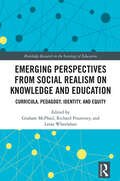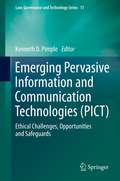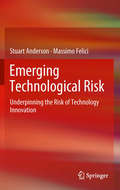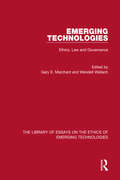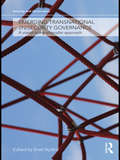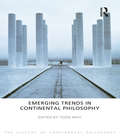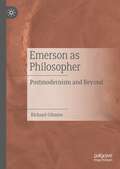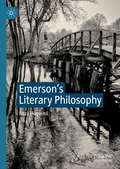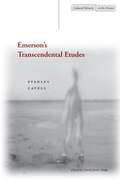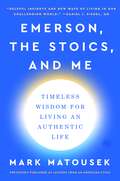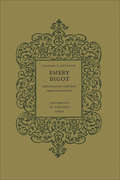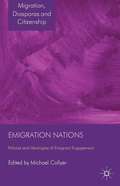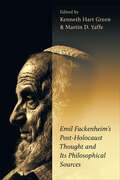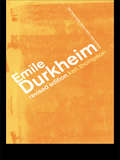- Table View
- List View
Emergence and Convergence
by Mario BungeTwo problems continually arise in the sciences and humanities, according to Mario Bunge: parts and wholes and the origin of novelty. In "Emergence and Convergence," he works to address these problems, as well as that of systems and their emergent properties, as exemplified by the synthesis of molecules, the creation of ideas, and social inventions. Along the way, Bunge examines further topical problems, such as the search for the mechanisms underlying observable facts, the limitations of both individualism and holism, the reach of reduction, the abuses of Darwinism, the rational choice-hermeneutics feud, the modularity of the brain vs. the unity of the mind, the cluster of concepts around 'maybe, ' the uselessness of many-worlds metaphysics and semantics, the hazards posed by Bayesianism, the nature of partial truth, the obstacles to correct medical diagnosis, and the formal conditions for the emergence of a cross-discipline. Bunge is not interested in idle fantasies, but about many of the problems that occur in any discipline that studies reality or ways to control it. His work is about the merger of initially independent lines of inquiry, such as developmental evolutionary biology, cognitive neuroscience, and socio-economics. Bunge proposes a clear definition of the concept of emergence to replace that of supervenience and clarifies the notions of system, real possibility, inverse problem, interdiscipline, and partial truth that occur in all fields.
Emergence and Expansion of Pre-Classical Mechanics (Boston Studies in the Philosophy and History of Science #270)
by Jürgen Renn Matthias Schemmel Matteo Valleriani Rivka FeldhayThis book is divided into two sections. The first section is concerned with the emergence and expansion of a form of mechanical knowledge defined by us as pre-classical mechanics. The definition purports to the period roughly between the 15th and the 17th century, before classical mechanics was formulated as a coherent and comprehensive mechanical theory in the sequel of Newton's work. The investigation of problems that were isolated from each other at the time but cohered into some kind of stable broad intellectual framework characterizes pre-classical mechanics. The second section is dedicated to specific case studies that present the application of a pre-classical framework to determined problems and to the investigation of specific natural phenomena. It consists of five case studies that illustrate in detail a reconstruction of pre-classical mechanics in particular constellations. Early modern theoretical, technical and social contexts transformed ancient and medieval mechanical knowledge in the course of its transmission.
Emergence and Modularity in Life Sciences
by Ulrich Lüttge Lars H. WegnerThis book focuses on modules and emergence with self-organization in the life sciences. As Aristotle observed so long ago, the whole is more than the sum of its parts. However, contemporary science is dominated by reductionist concepts and tends to neglect the non-reproducible features of complex systems, which emerge from the interaction of the smaller units they are composed of. The book is divided into three major parts; the essays in part A highlight the conceptual basis of emergence, linking it to the philosophy of science, systems biology and sustainability. This is subsequently exemplified in part B by applying the concept of emergence to various biological disciplines, such as genetics, developmental biology, neurobiology, plant physiology and ecology. New aspects of emergence come into play when biology meets the technical sciences, as revealed in a chapter on bionics. In turn, part C adopts a broader view, revealing how the organization of life follows a hierarchical order in terms of scalar dimensions, ranging from the molecular level to the entire biosphere. The idea that life is primarily and exclusively shaped by processes at the molecular level (and, in particular, by the information encoded in the genome) is refuted; rather, there is no hierarchy with respect to the level of causation in the cross-talk between the levels. In the last two chapters, the evolutionary trend toward ever-increasing complexity in living systems is interpreted in terms of the Gaia hypothesis sensu Lovelock: the entire biosphere is viewed as a functional unit (or ‘holobiont-like system’) organized to develop and sustain life on Earth.
Emergence and Reduction in Physics (Elements in the Philosophy of Physics)
by Patricia PalaciosThis Element offers an overview of some of the most important debates in philosophy and physics around the topics of emergence and reduction and proposes a compatibilist view of emergence and reduction. In particular, it suggests that specific notions of emergence, which the author calls 'few-many emergence' and 'coarse-grained emergence', are compatible with 'intertheoretic reduction'. Some further issues that will be addressed concern the comparison between parts-whole emergence and few-many emergence, the emergence of effective (-field) theories, the use of infinite limits, the notion of intertheoretic reduction and the explanation of universal and cooperative behavior. Although the focus will be principally on classical phase transitions and other examples from condensed matter physics, the main aim is to draw some general conclusions on the topics of emergence and reduction that can help us understand a variety of case-studies ranging from high-energy physics to astrophysics.
Emergence in Science and Philosophy (Routledge Studies In The Philosophy Of Science Ser. #6)
by Antonella CorradiniThe concept of emergence has seen a significant resurgence in philosophy and the sciences, yet debates regarding emergentist and reductionist visions of the natural world continue to be hampered by imprecision or ambiguity. Emergent phenomena are said to arise out of and be sustained by more basic phenomena, while at the same time exerting a "top-down" control upon those very sustaining processes. To some critics, this has the air of magic, as it seems to suggest a kind of circular causality. Other critics deem the concept of emergence to be objectionably anti-naturalistic. Objections such as these have led many thinkers to construe emergent phenomena instead as coarse-grained patterns in the world that, while calling for distinctive concepts, do not "disrupt" the ordinary dynamics of the finer-grained (more fundamental) levels. Yet, reconciling emergence with a (presumed) pervasive causal continuity at the fundamental level can seem to deflate emergence of its initially profound significance. This basic problematic is mirrored by similar controversy over how best to characterize the opposite systematizing impulse, most commonly given an equally evocative but vague term, "reductionism." The original essays in this volume help to clarify the alternatives: inadequacies in some older formulations and arguments are exposed and new lines of argument on behalf the two visions are advanced.
Emergence, Entanglement, and Political Economy (Studies in Public Choice #38)
by Diana W. Thomas David J. HebertThis volume is intended to serve as a review of the “next generation” of political economy scholars in what can be called the “Wagnerian” tradition, which traces its roots to Buchanan and De Viti De Marco in the 1930s, who argued that any decision that results from a political entity must be the product of individual decision makers operating within some framework of formal and informal rules. To treat these decisions as if they were the product of one single mind, or even simply the additive result of several decisions, is to fundamentally misunderstand and mischaracterize the dynamics of collective action. Today, Richard Wagner is among the most prominent theorists in analyzing the institutional foundations of the economy and the organization of political decision-making. In this collection of original essays, former students schooled in this tradition offer emerging insights on public choice theory, public finance, and political economy, across a range of topics from voting behavior to entrepreneurship.
Emergency Powers in Asia: Exploring the Limits of Legality
by Victor V. Ramraj Arun K. ThiruvengadamWhat is the relevance of contemporary debates over emergency powers for countries situated in Asia? What role does, and should, the constitution play in constraining these powers? The essays in this collection address these issues, drawing on emergency situations in over 20 countries in Asia as a ready-made laboratory for exploring the relationship between emergency powers and constitutionalism. This volume therefore rests squarely at the intersection of two debates - a debate over the ability of law to constrain the invocation and use of emergency powers by the executive in times of crisis, and a debate over the nature and viability of constitutionalism in Asia. At this intersection are fundamental questions about constitutionalism and the nature of the modern state, questions that invite legal, political, sociological and historical analysis.
Emergency Presidential Power
by Chris EdelsonCan a U. S. president decide to hold suspected terrorists indefinitely without charges or secretly monitor telephone conversations and e-mails without a warrant in the interest of national security? Was the George W. Bush administration justified in authorizing waterboarding? Was President Obama justified in ordering the killing, without trial or hearing, of a U. S. citizen suspected of terrorist activity? Defining the scope and limits of emergency presidential power might seem easy-just turn to Article II of the Constitution. But as Chris Edelson shows, the reality is complicated. In times of crisis, presidents have frequently staked out claims to broad national security power. Ultimately it is up to the Congress, the courts, and the people to decide whether presidents are acting appropriately or have gone too far. Drawing on excerpts from the U. S. Constitution, Supreme Court opinions, Department of Justice memos, and other primary documents, Edelson weighs the various arguments that presidents have used to justify the expansive use of executive power in times of crisis. Emergency Presidential Power uses the historical record to evaluate and analyze presidential actions before and after the terrorist attacks of September 11, 2001. The choices of the twenty-first century, Edelson concludes, have pushed the boundaries of emergency presidential power in ways that may provide dangerous precedents for current and future commanders-in-chief.
Emergent Pedagogy in England: A Critical Realist Study of Structure-Agency Interactions in Higher Education (New Studies in Critical Realism and Education (Routledge Critical Realism))
by Bushra ShararThis book aims to show how a meta-theory of critical realism can be applied to research about pedagogy in the changing landscape of higher education in England. It introduces some of the key ideas of critical realism, and its potential to clarify complex issues that arise in research. This book draws on a critical realist study of structure/agency interactions in three contrasting higher education institutions. Seven case studies of lecturers, over the three universities, are considered to explore the interplay of global, national and institutional structures and processes in their everyday working lives and the extent of their agency in these settings. Conceptual approaches to pedagogy are developed through an application of critical realism to the nature of knowledge, human agency and structure-agency interactions against the changing landscape in higher education at global, national and institutional levels. The book offers a way out of the current malaise in educational research which appears to be stuck between empiricist reductionism and hermeneutic interpretive positions. Highlighting the importance of ontological analyses, this book explores a realist approach to learning, pedagogy and knowledge in English higher education and will be of interest to students, scholars and practitioners working in education, critical realism and philosophy more generally.
Emerging Federal Structures in the Post-Cold War Era (Federalism and Internal Conflicts)
by Soeren Keil Sabine KroppThis book conceives federalism not as a static institutional architecture, but as a dynamic formation always in flux. This may entail processes of federalization, but in some cases also lead to de-federalization. It looks at emerging federal structures worldwide and analyses federal structures: their emergence, operation and categorization. The contributors highlight that the “emergence” of these federal structures has multiple facets, from the recognition of ethnic diversity to the use of federalism as a tool of conflict resolution. Identifying and categorizing processes of federalization and defederalization in a variety of cases, the book provides much needed empirical and theoretical discussion on emerging federal structures and the changing nature of federalism in the post-Cold War era.
Emerging Perspectives from Social Realism on Knowledge and Education: Curricula, Pedagogy, Identity, and Equity (Routledge Research in the Sociology of Education)
by Graham McPhail Leesa Wheelahan Richard PountneyThis book brings the key ideas and concepts of social realism to bear on current debates in the fields of knowledge and curriculum.The key concern of this collection is to highlight matters related to knowledge and the influence these dimensions have on the formation of curricula, pedagogy, identity, and equity in educational contexts. Presenting new perspectives on the place of various types and forms of knowledge in contemporary education, this book explores two central questions, ‘what type of knowledge is most important to include in a curriculum?’ and ‘what is meant by disciplinary knowledge?’ The chapters use empirical examples to illustrate how the issues play out on a global stage, interweaving the social justice concern of equitable access to disciplinary knowledge throughout. In particular, the authors address the emerging theorisation of issues related to the decolonisation of curricula, the recontextualisation of ‘non-traditional’ knowledge into the curriculum, and teacher education.Offering new philosophical and theoretical perspectives, this book will be of interest to researchers, scholars, and students examining the fields of knowledge and curriculum, and the sociology of education more broadly.
Emerging Pervasive Information and Communication Technologies (PICT): Ethical Challenges, Opportunities and Safeguards
by Kenneth D. PimpleThis book provides a wide and deep perspective on the ethical issues raised by pervasive information and communication technology (PICT) - small, powerful, and often inexpensive Internet-connected computing devices and systems. It describes complex and unfamiliar technologies and their implications, including the transformative potential of augmented reality, the power of location-linked information, and the uses of "big data," and explains potential threats, including privacy invaded, security violated, and independence compromised, often through widespread and lucrative manipulation. PICT is changing how we live, providing entertainment, useful tools, and life-saving systems. But the very smartphones that connect us to each other and to unlimited knowledge also provide a stream of data to systems that can be used for targeted advertising or police surveillance. Paradoxically, PICT expands our personal horizons while weaving a web that may ensnare whole communities. Chapters describe particular cases of PICT gone wrong, but also highlight its general utility. Every chapter includes ethical analysis and guidance, both specific and general. Topics are as focused as the Stuxnet worm and as broad as the innumerable ways new technologies are transforming medical care. Written for a broad audience and suitable for classes in emerging technologies, the book is an example of anticipatory ethics - "ethical analysis aimed at influencing the development of new technologies" (Deborah Johnson 2010). The growth of PICT is outpacing the development of regulations and laws to protect individuals, organizations, and nations from unintended harm and malicious havoc. This book alerts users to some of the hazards of PICT; encourages designers, developers, and merchants of PICT to take seriously their ethical responsibilities - if only to "do no harm" - before their products go public; and introduces citizens and policy makers to challenges and opportunities that must not be ignored.
Emerging Powers, Global Justice and International Economic Law: Reformers of an Unjust Order?
by Andreas BuserThe book assesses emerging powers’ influence on international economic law and analyses whether their rhetoric of reforming this ‘unjust’ order translates into concrete reforms. The questions at the heart of the book surround the extent to which Brazil, Russia, India, China, and South Africa individually and as a bloc (BRICS) provide alternative regulatory ideas to those of ‘Western’ States and whether they are able to convert their increased power into influence on global regulation. To do so, the book investigates two broader case studies, namely, the reform of international investment agreements and WTO reform negotiations since the start of the Doha Development Round. As a general outcome, it finds that emerging powers do not radically challenge established law. ‘Third World’ rhetoric mostly does not translate into practice and rather serves to veil economic interests. Still, emerging powers provide for some alternative regulatory ideas, already leading to a diversification of international economic law. As a general rule, they tend to support norms that allow host States much policy space which could be used to protect and fulfil socio-economic human rights, especially – but not only – in the Global South.
Emerging Technological Risk
by Massimo Felici Stuart AndersonClasses of socio-technical hazards allow a characterization of the risk in technology innovation and clarify the mechanisms underpinning emergent technological risk. Emerging Technological Risk provides an interdisciplinary account of risk in socio-technical systems including hazards which highlight: · How technological risk crosses organizational boundaries, · How technological trajectories and evolution develop from resolving tensions emerging between social aspects of organisations and technologies and · How social behaviour shapes, and is shaped by, technology. Addressing an audience from a range of academic and professional backgrounds, Emerging Technological Risk is a key source for those who wish to benefit from a detail and methodical exposure to multiple perspectives on technological risk. By providing a synthesis of recent work on risk that captures the complex mechanisms that characterize the emergence of risk in technology innovation, Emerging Technological Risk bridges contributions from many disciplines in order to sustain a fruitful debate. Emerging Technological Risk is one of a series of books developed by the Dependability Interdisciplinary Research Collaboration funded by the UK Engineering and Physical Sciences Research Council.
Emerging Technologies: Ethics, Law and Governance (The\library Of Essays On The Ethics Of Emerging Technologies Ser.)
by Gary E. Marchant Wendell WallachEmerging technologies present a challenging but fascinating set of ethical, legal and regulatory issues. The articles selected for this volume provide a broad overview of the most influential historical and current thinking in this area and show that existing frameworks are often inadequate to address new technologies - such as biotechnology, nanotechnology, synthetic biology and robotics - and innovative new models are needed. This collection brings together invaluable, innovative and often complementary approaches for overcoming the unique challenges of emerging technology ethics and governance.
Emerging Transnational: A Statist-Transnationalist Approach (Security and Governance)
by Ersel AydinliThis book presents a selection of edited essays written by leading international scholars engaging with practicing intelligence, military, and police officers and responding to their first-hand international security cooperation experiences. The resulting chapters provide original theoretical perspectives on evolving international security cooperation practices. Beginning with the premise that intelligence cooperation-domestically between agencies, internationally between states, and transnationally among states, sub-state and non-state actors-is essential in order to successfully counter the evolving transnational nature of security threats, the authors explore the transnationalization in states' responses to a transnational security threat like 'global' terror. They assess whether early signs of a "statist transnationalism" for a new global security cooperation regime can be identified, and look at the use of extraordinary rendition and police liaisons as means for the development and growth of transnational security cooperation. This book will be of interest to students and scholars of international relations, terrorism, security, policing and intelligence.
Emerging Trends in Continental Philosophy (The History of Continental Philosophy #8)
by Todd May"Emerging Trends in Continental Philosophy" presents a comprehensive and accessible analysis of the most recent developments in European thought. From feminist thought to environmental philosophy to analytic themes in Continental philosophy to recent discussions of citizenship, "Emerging Trends" offers an overview of the currents animating contemporary Continental philosophy. The volume focuses on thematic developments rather than individual figures, allowing the reader to follow the threads that weave different thinkers together. Each essay is written by an expert in the area covered, displaying the passion of these experts for the fields they discuss without lapsing into jargon. The volume provides a broad map of the landscape of recent European thought as well as the latest thinking from leading scholars on key themes.
Emerson as Philosopher: Postmodernism and Beyond
by Richard GilmoreThis book considers the role of postmodernism (skepticism towards metanarratives and anti-essentialism) in Ralph Waldo Emerson's philosophy by putting it in conversation with key 20th and 21st century thinkers such as Beauvoir, Coates, Derrida, Paz, Rorty, and Zizek. Postmodern Emerson shows how Emersonian skepticism to metanarratives such as sexism, racism, Beauvoiran "serious values," and others, can help us face some of society's gravest contemporary social and philosophical challenges. Methodologically, the book exemplifies Emersonian postmodernism by defying traditional philosophical metanarratives about the difference between high and low culture or serious and ridiculous subjects, and Emerson with what would seem to be his opposite. This is itself a postmodern gesture, breaking rules of genre and topic to make unlikely but interesting connections. Above all, this book proves that in this time of social division and widespread despair, Emerson can help.
Emerson's Literary Philosophy
by Reza HosseiniThis book situates Ralph Waldo Emerson in the tradition of philosophy as “spiritual exercise”, arguing that the defining feature of his literary philosophy is the conviction that there is an inherent link between moral persuasion and literary excellence. Hosseini persuasively argues that the Emersonian project can be viewed as an extension of Socrates’ call for a return to the beginning of philosophy, to search for a way of revolutionizing our ways of seeing from within. Examining Emerson’s provocative style of writing, Hosseini contends that his prose is shaped by a desire to bring about psychagogia, or influencing the soul through the power of words. This book furthermore examines the evolving nature of Emerson’s thoughts on “scholarly action” and its implications, his religious temperament as an aesthetic experience of the world through wonder, and the reasons for a resounding acknowledgment of despair in his essay “Experience.” In the concluding chapter, Hosseini explores the depth of Emerson’s engagement with the classical Persian poets and argues that what we may call his “literary humanism” is informed by Persian Adab, exemplified in the writings of Rumi, Hafiz, and Saadi. Weaving together themes from Persian philosophy and Emersonian transcendentalism, Hosseini establishes Emerson’s way of seeing as refreshingly relevant, showing that the questions he tackled in his writings are as pressing today as they were in his time.
Emerson's Transcendental Etudes
by Stanley Cavell David Justin HodgeThis book is Stanley Cavell’s definitive expression on Emerson. Over the past thirty years, Cavell has demonstrated that he is the most emphatic and provocative philosophical critic of Emerson that America has yet known. The sustained effort of that labor is drawn together here for the first time into a single volume, which also contains two previously unpublished essays and an introduction by Cavell that reflects on this book and the history of its emergence. Students and scholars working in philosophy, literature, American studies, history, film studies, and political theory can now more easily access Cavell’s luminous and enduring work on Emerson. Such engagement should be further complemented by extensive indices and annotations. If we are still in doubt whether America has expressed itself philosophically, there is perhaps no better space for inquiry than reading Cavell reading Emerson.
Emerson, the Stoics, and Me: Timeless Wisdom for Living an Authentic Life
by Mark Matousek“This is a beautiful book, full of ideas that could help restore America’s genius for freedom and promise.” —Thomas Moore, New York Times bestselling author of Care of the SoulA lifelong Emersonian scholar, teacher, and spiritual seeker reveals how American philosopher Ralph Waldo Emerson’s twelve essential teachings hold the answer to living an authentic and fulfilling life, one that is in harmony with our souls.Ralph Waldo Emerson was a spiritual revolutionary whose profound vision of human potential came to define the American character. Known as America’s original Stoic, he offered a radical message of optimism, authenticity, and self-realization that is more necessary today than ever.In this timely, remarkable book, noted memoirist and teacher Mark Matousek reveals the depths of Emerson’s extraordinary wisdom, demonstrating how his timeless philosophy can help us navigate the challenges of contemporary life. Using personal stories, psychological research, and life lessons from Emerson and his contemporaries—including Thoreau and Whitman—he offers practical lessons in the art of living.They include:ON ORIGINALITY—Character is everythingON PERSPECTIVE—You are how you seeON NONCONFORMITY—Build your own worldON RESILIENCE—Without confidence, the universe is against youON VITALITY—A stream of power runs through youAnd moreEmerson’s far-reaching vision of excellence and spiritual flourishing is the medicine we need to heal ourselves. “Trust yourself,” he teaches. “Once you make a decision, the universe conspires to make it happen.” This philosophy of hope, known as transcendentalism, is the vein of gold in the American psyche. Lessons from an American Stoic helps us to reclaim our national treasure.
Emery Bigot: Seventeenth-Century French Humanist
by Leonard DoucetteEmery Bigot's life spans the most brilliant years of seventeenth-century France. He left some six hundred letters addressed to the four corners of literary Europe; among his correspondents, acquaintances, and friends were men of the stature of Jean Chapelain, Nicolaus Heinsius, Charles du Cange, Richard Simon, John Milton, and Gilles Ménage. He travelled widely and was for some forty years at the very centre pf a firmly established, smoothly functioning network of mutual assistance and scholarly information that linked the countries of western Europe. From Uppsala to Venice, from Vienna to Oxford, Leiden, London: a network which quite naturally considered Paris its centre, and whose members represented every interest, very segment of intellectual society. Bigot was also the creator of what was perhaps the most important private library of his era. Yet today he is almost unknown, and his correspondence, scattered widely, has not been examined thoroughly since his death. This detailed biography and critical study is based on Bigot's letters and on other unpublished materials in France, Italy, Holland, Denmark, and England. Although much effort has been directed towards research on the more prominent contemporaries of Bigot, he himself – better known to the scholars of his period than a Racine, a La Fontaine, or a Molière – has gone unappreciated. Professor Doucette's book shows that Bigot represents an essential and seriously neglected side of French and European humanistic studies in the seventeenth century. Bigot's role as an outstanding classical scholar and bibliographic expert, his publications and projects for publications, his correspondence, and what is perhaps the most important facet of his activity, his collaboration with other authors in seventeenth-century Europe, all receive full and intensive coverage. This book holds special interest for scholars in several disciplines, especially historians of French literature and civilization, classicists, philologists, bibliophiles and bibliographers, and historians of religion.
Emigration Nations
by Michael CollyerUntil very recently emigrants were considered an embarrassment, an irritation or an irrelevance by most states. The long experience of emigrant engagement in certain historical emigration countries, such as Italy, was very much the exception. Since about 2000, countries around the world have shown much greater enthusiasm for policies to encourage the loyalty of nationals who have made a permanent home elsewhere. These developments have changed the relationship between state institutions and emigrant nationals. Policies of emigrant engagement also challenge fundamental understandings about the nature of political society in the modern era; the notion of states as territorial institutions or the understanding of citizenship as membership in a territorially bounded polity are both undermined. This book provides copious evidence of this process, with detailed, comparable case studies of twelve countries and a new theoretical framework that helps explain changing policies towards emigrants.
Emil Fackenheim’s Post-Holocaust Thought and Its Philosophical Sources (The Kenneth Michael Tanenbaum Series in Jewish Studies)
by Kenneth Hart Green Martin D. YaffeRecognized as one of the leading philosophers and Jewish thinkers of the twentieth century, Emil Ludwig Fackenheim has been widely praised for his boldness, originality, and profundity. As is well-known, a striking feature of Fackenheim’s thought is his unwavering contention that the Holocaust brought about a radical shift in human history, so monumental and unprecedented that nothing can ever be the same again. Fackenheim regarded it as the specific duty of thinkers and scholars to assume responsibility to probe this historical event for its impact on the human future and to make its immense ramifications evident. In Emil Fackenheim’s Post-Holocaust Thought and Its Philosophical Sources, scholars consider important figures in the history of philosophy – including Kant, Hegel, Heidegger, and Strauss – and trace how Fackenheim's philosophical confrontations with each of them shaped his overall thought. This collection details which philosophers exercised the greatest influence on Fackenheim, and how he diverged from them. Incorporating widely varying approaches, the contributors in the volume wrestle with this challenge historically, politically, and philosophically in order to illuminate the depths of Fackenheim’s own thought.
Emile Durkheim
by Prof Kenneth ThompsonThis book examines Durkheim's considerable achievements and situates them in their social and intellectual contexts, with a concise account of the major elements of Durkheim's sociology. The book includes a critical commentary on the four main studies which exemplify Durkheim's contribution to sociology: The Division of Labour in Society; Suicide; The Rules of Sociological Method and The Elementary Forms of Religious Life.
